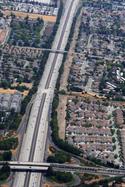Our economy is going to get better some day, step by step. But it’s bad right now, with a full recovery likely a matter of years rather than months away. Public officials should plan accordingly, keeping in mind how the vicious cycle of a bad economy turns typical decision making on its head. read more »
Los Angeles
Tough Budget Math for City Politicians: Bad Economy + Human Nature = More Cops
A Holiday Tale for All
A few nights before Christmas
The middle of Hanukkah
Los Angeles is stirring
A City Symphonica
Shoppers on Broadway
Like peas in a pod
Wishing each other
Feliz Navidad read more »
City Planning and The Politics of Pollution
Part Two. Yesterday, in Part One, Critser discussed scientific advances in understanding air pollution. Today, he addresses the social implications.
The new science of air pollution, with its emphasis on dose-response mechanisms, may remake the traditional advocacy realm of social and environmental justice. In the past, that world has been focused on class, race and ethnicity, classic markers of inequality and vulnerability. Today, the focus is more “exposure driven.” “Dosage… may be something people who have ignored environmental justice can get their heads around,” one researcher at last month’s Environmental Epidemiology conference in Pasadena noted. “It may get people’s attention on something that affects us all.” read more »
Will The New Air Pollution Science Choke City Planners?
Part One of A Two-Part Series
Not long ago, Michael Woo, a former Los Angeles city councilman and current member of the Los Angeles City Planning Commission, took up a case pending approval by that body: a mixed housing-retail development near the intersection of Cahuenga Boulevard and Riverside Drive. Like many of the remaining buildable sites in the city, the property is right next to a roaring motorway; the windows of some apartments would look right out onto the 134 Freeway. To Angelinos, who have grown up in a car culture, it was hardly a remarkable proposal. But Woo, perhaps one of the brainier members of the city’s political elite—after losing a mayoral race to Richard Riordan in the early 1990s he became a professor of public policy at University of Southern California—had a problem with it, and he couldn’t quite let it go. read more »
L.A.’s Big-Bucks Plan for Upper Floors on Broadway Overlooks Facts at Ground Level
City officials and private business owners recently gathered to celebrate the extended holiday hours of the Metropolitan Transportation Authority (MTA) Metro Red Line train service between Hollywood and Downtown. Private businesses put up $50,000 or so to pay for the Red Line to run an extra two hours — until 3 a.m. — on weekends through December 27. The local business community also came up with private funds for free service on city-operated DASH buses that will offer connections to late-night Red Line riders and others. read more »
Glimpsing Reasons to Give Thanks in the City of Angels
This is one tough Thanksgiving coming up for a lot of folks in Los Angeles, where so many have been left vulnerable by the economic downturn.
This place of ours, this city, looked good for the ride just a few months ago.
Now it looks different.
There are different faces on our streets. Some are new, out of place, in a daze over where they have landed. read more »
- Login to post comments
In Ethnic Enclaves, The U.S. Economy Thrives
Dr. Alethea Hsu has a strange-seeming prescription for terrible times: She is opening a new shopping center on Saturday. In addition, more amazingly, the 114,000 square foot Irvine, Calif., retail complex, the third for the Taiwan native's Diamond Development Group, is just about fully leased.
How can this be in the midst of a consumer crack-up, with credit card defaults and big players like General Growth struggling for their existence? The answer is simple: Hsu's mostly Asian customers – Korean, Chinese, Taiwanese, Japanese – still have cash. read more »
Spanish, Obama, and Cambio in St. Louis
There are two definitive differences between St. Louis and Los Angeles: Autumn is better in St. Louis, and more people speak Spanish in Los Angeles. And, yeah, there’s the Mississippi River and the humidity and the beach and the film industry and the palm trees, but in terms of my own private geography and topophilia, autumn and Spanish are the differences that matter. I long for LA in every season but fall, and a part of my longing is, inevitably, a longing for Spanish. read more »
A Twice-Told Tale of Black, Brown & LAPD Blue
This is a story of heartbreak and hope – and neither end of the tale made the news.
A curious combination of factors recently led me to these events on a street in South Los Angeles, where worn houses and skinny palm trees can sometimes trick you into seeing nothing much.
Then a crumpled baby bottle near a truck’s tire caught my eye and kicked me in the gut.
The bottle belonged to a toddler who had just been crushed to death.
The mother lost track of the baby. The baby crawled behind the wheel of a neighbor’s truck. The neighbor didn’t notice the child there. read more »
- Login to post comments
California Disconnect: Don’t Get Out the Vote for Congress, State Legislature
Have you heard about the current election season in Los Angeles?
Sure, we’ve all gotten word about the presidential campaign. But how much have you heard about races for the U.S. Congress or State Legislature?
The member of the U.S. House of Representatives who represents my neighborhood is up for re-election, along with his 434 colleagues. So is the fellow who represents me in the California State Assembly—and his 79 colleagues. read more »
- Login to post comments






















